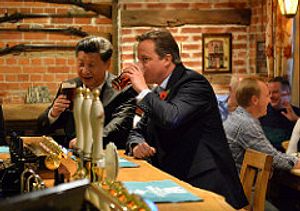On December 18, the U.K. Advisory Committee on Business Appointments (ACOBA) — a non-departmental public body that unofficially regulates the new business roles of Britain’s former politicians — revealed that former British Prime Minister David Cameron is going to take a leadership role in a new $1 billion China-U.K. private equity fund, called the U.K.-China Fund.
According to a statement released by the ACOBA, the Fund will help promote bilateral economic cooperation in a wide variety of sectors, including technology, healthcare, high-end manufacturing, infrastructure, and new energy. Cameron will be vice chairman of the fund, a paid role. Through its investment activities, the fund will help U.K. companies enter the Chinese market and vice versa, the statement said.
The ACOBA also noted that the capital for the fund will come from leading Chinese and U.K. institutional investors, without detailing exactly who these investors will be.
Unsurprisingly, as soon as the information was released, some Western media outlets attacked Cameron for joining China’s bench as Beijing is strengthening “its grip over Britain.” The fund will be part of China’s Belt and Road Initiative (BRI), which detractors say will help China dominate the global economy.
However, such criticism seems to be based on pure sinophobia. Even the British government is supportive of the fund and Cameron’s role in it.
According to the ACOBA, the British government believes that “if managed well, the Fund should bring economic benefits to the UK by promoting UK-China economic cooperation; and helping to overcome informational, logistical and operational barriers to UK firms developing successful businesses in China or with Chinese partners. ”
In addition, the UK-China Fund will involve no taxpayer money; thus even if the fund fails to make any profit, taxpayers’ interests will not be harmed.
Undoubtedly, the fund will benefit China as the country has been actively pursuing a bigger role in the international economic sphere under the framework of the BRI.
The British government has always taken a considerably positive stance toward China’s BRI.
On December 16, the U.K. government announced a series of projects to partner with China on the BRI. For example, Douglas Flint, former chairman of HSBC Group, was appointed as the chancellor’s city envoy to the BRI. These projects can “showcase the expertise” of Britain and boost U.K. businesses, as the announcement said.
Similarly, Cameron’s leading role in the new fund can also showcase U.K. expertise and, more importantly, make sure that the fund can function according to U.K. standards, which are accepted by the international community.
The only concern here is actually whether Cameron can act as vice chairman properly and manage the fund well, rather than if Cameron should take this role at all.
According to the statement from the ACOBA, Cameron envisages that the fund will only involve two to three days per month of his time. The extremely limited time investment will likely make him a de facto nominal vice chairman, which may compromise his contribution to the fund in reality.

































